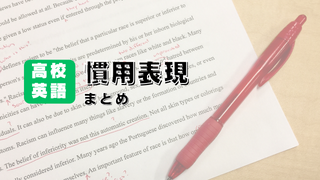共通テストや大学入試英語で「よく出る慣用表現」についてまとめています。
よく出る慣用表現
慣用表現は、文法問題で直接出題されるだけでなく、長文や会話文でのキーセンテンスになる場合も少なくありません。今回は、おさえておくべき「慣用表現」を文法の単元ごとにまとめています。それでは、「よく出る慣用表現」のまとめです。
助動詞の慣用表現
- cannot help ~ ing(~せざるをえない)
- cannot ~ too(いくら~してもしすぎではない)
- cannot ~ enough(いくら~してもしきれない)
- may well(~するのももっともだ)
- may as well(~するほうがいいだろう)=had better
- might as well ~ as…(…するなら~したほうがまし)
動名詞の重要表現
- need doing ~する必要がある
- on doing ~するとすぐに =as soon as
- In doing ~するときに =when
- It is no use doing ~してもむだだ
- worth doing ~するだけの価値がある
- cannot help ~ing ~ないではいられない
- feel like ~ing ~気がしない
- prevented (人)from ~ing (人)が~するのを妨げる
- There is no ~ing ~のことはわからない(できない)
- How about ~ing ~しませんか/~してはどうですか =What do you say to ~ing
- be used to ~ing ~するのに慣れている
- make a point of ~ing ~することにしている
- on the point of ~ing まさに~しようとする
- without ~ing ~なしに
不定詞の重要表現
- I’m so busy that I can’t travel.(私は、とても忙しいので旅行に行くことができません。)
- I am so rich that I can a new car.(私は、とてもお金持ちなので、新しい車を買うことができます。)
- I’m too busy to travel.(私は、とても忙しいので旅行に行くことができません。)=
- I’m so busy that I can’t travel.
- I am rich enough to buy a new car .= I am so rich that I can a new car.(私は、とてもお金持ちなので、新しい車を買うことができます。)
不定詞の慣用表現
- to tell the truth, 「本当のことを言うと」
- to begin with 「まず始めに」
- to be sure 「確かに」
- to be frank with you 「率直に言えば」
- strange to say 「奇妙なことに」
- so to speak 「いわゆる」
- to make matters worse 「さらに悪いことに」
- to say nothing of, not to speak of, not to mention, needless to say,「いうまでもなく」
分詞の重要表現
- There is(are) +S+分詞(Sが~している/されている)
- go~ing(~しに行く)
- 「~するのに/~して」の意味の現在分詞 I was busy cleaning the room.私は、部屋を掃除するのに忙しかった。
whatを用いた表現
- what S is (現在の S) what S was, what S used to be (過去の S)(かつてのS)
- what (we, they, you) call = what is called (いわゆる)
- what is worse~ (さらに悪いことに)
- A is to B what C is to D (AとBの関係はCとDの関係に等しい。)
- what with~ and what with… ~やら…やらで
比較の重要表現
- less + 原級~+than … = not as(so) ~ as…(…より~でない)⇒ (… ほど~でない)
(例)My father is less tall than I. (父は私より背が高くない。)= My father is not as tall as I. - the + 比較級+of the two(2者のうちでより~な方)
- much, far, even + 比較級~+ than … (…よりずっと~)
- more + 原形+than …
(例)She is more clever than wise. (彼女は賢いと言うより、むしろ利発だ。) - senior to ~ (~より年上の)
- junior to~ (~より年下の)
- superior to ~ (~よりすぐれて)
- inferior to ~ (~より劣って)
- prefer A to B (BよりAが好きだ)
- 比較級 and 比較級(ますます~)
- the + 比較級~, the + 比較級…(~ すればするほど…)
(例)The higher we go up, the colder it becomes cold.(高く登れば上るほど寒くなる。) - all the +比較級~ + for … (because S+V)(…なのでそれだけ一層~)
(例)I like her all the better for her faults.(私は彼女が欠点を持っているので、それだけ一層彼女が好きだ。) - no more than ~ = only(たった~) ( = not any more than )
(例)He has no more than 100 yen. (彼は100円しかもっていない。) - not more than ~ = at most~(せいぜい)
(例)He has not more than 1000 yen. (彼はせいぜい千円しか持っていない。) - A is no more B than C is (D)(CがDでないように、AはBでない)
(例)A whale is no more a fish than a horse is ( a fish ).(馬が魚でないように、鯨は魚ではない。= 鯨が魚でないのは、馬が魚でないのと同様だ。) - know better than ~(~ するほど馬鹿ではない)
(例)He knows better than to do such a thing.(彼はそのようなことをするほど馬鹿ではない。) - 肯定文+ much(still) more ~(なおさら~だ)
(例)She can speak French, much more English.(彼女はフランス語が話せる。英語はなおさらだ。) - 否定文+much(still) less ~(なおさら~ではない)
(例)He cannot stand any more, much less walk around. (彼はもはや立つことはできない。歩き回るのはなおさらできない。) - none the + 比較級 + for …(because S+V) (…なのに、一向に~でない)
- none the less for… (…だがやはり~)
- no less than ~ = as many (much) as (~も)
- not less than ~ = at least ~ ( 少なくとも)
- A is no less B than C is (D) (CがDであるように、AはBである)
- no longer ~ (今では)もはや~ではない
- more or less (多少、多かれ少なかれ)
- sooner or later (早晩、遅かれ早かれ)
- no more (これから先、もう~ない)
最上級の重要表現
- much, by far + the + 最上級~ (ずばぬけて一番~)
- 同一物(人)についての比較の最上級は、the をつけない
(例)This lake is deepest at this point. (この湖はこの地点が一番深い。) - most = very
(例)She is a most beautiful girl. (彼女は非常に美しい少女だ。)注意一番美しいではありません。 - the + 最上級 = even~(どんな~でも)
- the least(最も~でない )
- the last(最も~ しそうにない)
(例)She is the last girl to be late for school. (彼女は最も学校に遅れそうにない少女だ。) - at one’s best (最良の状態で)
- at best (いくらよくても、せいぜい)
- not ~ in the least = not ~ at all (全く~でない)
- make the most (best) of ~ (~を最大限に利用する)
仮定法の慣用表現
- as it were (いわゆる)= so to speak
- otherwise (もしそうでないならば)
- with ~ (もし~があれば:~があったら)
- would that = I wish (~であればなあ)
否定の慣用表現
- cannot but 原形「~せずにはいられない」
- no longer=not ~anymore「もう~ない」
- nothing but 「~しか…ない」
- not ~ until「…するまで~しない」
- It is not long before=~before long「まもなく~する」
- anything but 「決して~でない」
- fail to do 「~できない」
- the last ~ to do「決して…しない~」
- far from~「~どころではない」
- free from~「~がない」
- above~「~の能力がない」
- beyond~「~を超えている」

コメント